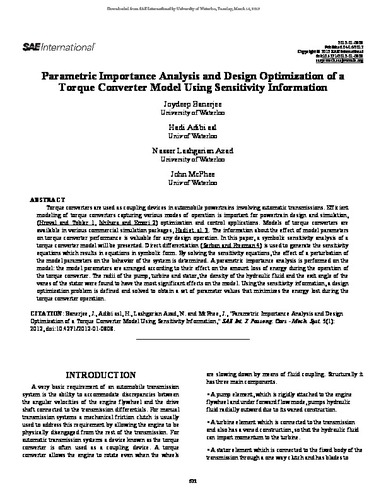| dc.contributor.author | Banerjee, Joydeep | |
| dc.contributor.author | Adibi asl, Hadi | |
| dc.contributor.author | Lashgarian Azad, Nasser | |
| dc.contributor.author | McPhee, John | |
| dc.date.accessioned | 2017-03-16 18:53:07 (GMT) | |
| dc.date.available | 2017-03-16 18:53:07 (GMT) | |
| dc.date.issued | 2012-04-16 | |
| dc.identifier.uri | http://dx.doi.org/10.4271/2012-01-0808 | |
| dc.identifier.uri | http://hdl.handle.net/10012/11528 | |
| dc.description | Replicated with permission by SAE Copyright © 2017 SAE International. Further distribution of this material is not permitted without prior permission from SAE. | en |
| dc.description.abstract | Torque converters are used as coupling devices in automobile powertrains involving automatic transmissions. Efficient modeling of torque converters capturing various modes of operation is important for powertrain design and simulation, (Hroval and Tobler 1, Ishihara and Emori 2) optimization and control applications. Models of torque converters are available in various commercial simulation packages, Hadi et. al. 3. The information about the effect of model parameters on torque converter performance is valuable for any design operation. In this paper, a symbolic sensitivity analysis of a torque converter model will be presented. Direct differentiation (Serban and Freeman 4) is used to generate the sensitivity equations which results in equations in symbolic form. By solving the sensitivity equations, the effect of a perturbation of the model parameters on the behavior of the system is determined. A parametric importance analysis is performed on the model: the model parameters are arranged according to their effect on the amount loss of energy during the operation of the torque converter. The radii of the pump, turbine and stator, the density of the hydraulic fluid and the exit angle of the vanes of the stator were found to have the most significant effects on the model. Using the sensitivity information, a design optimization problem is defined and solved to obtain a set of parameter values that minimizes the energy lost during the torque converter operation. | en |
| dc.description.sponsorship | Financial support for this work has been provided by the Natural Sciences and Engineering Research Council of Canada (NSERC), Toyota, and Maplesoft. | en |
| dc.language.iso | en | en |
| dc.publisher | SAE International | en |
| dc.title | Parametric Importance Analysis and Design Optimization of a Torque Converter Model Using Sensitivity Information | en |
| dc.type | Article | en |
| dcterms.bibliographicCitation | Banerjee, J., Adibi asl, H., Lashgarian Azad, N., & McPhee, J. (2012). Parametric Importance Analysis and Design Optimization of a Torque Converter Model Using Sensitivity Information. SAE International Journal of Passenger Cars - Mechanical Systems, 5(1), 621–638. https://doi.org/10.4271/2012-01-0808 | en |
| uws.contributor.affiliation1 | Faculty of Engineering | en |
| uws.contributor.affiliation2 | Systems Design Engineering | en |
| uws.typeOfResource | Text | en |
| uws.peerReviewStatus | Reviewed | en |
| uws.scholarLevel | Faculty | en |

